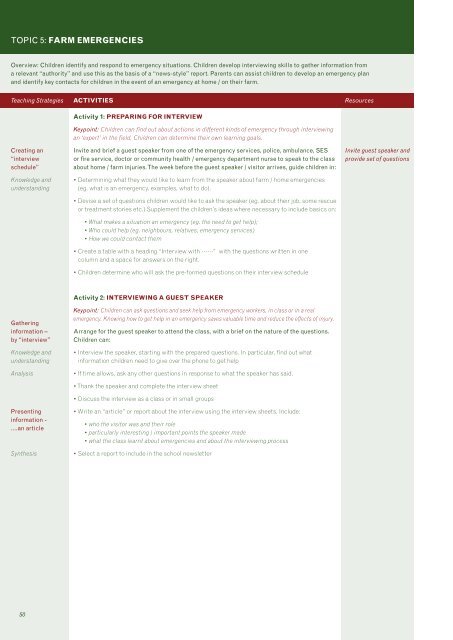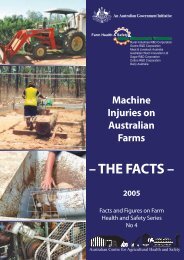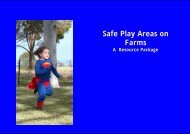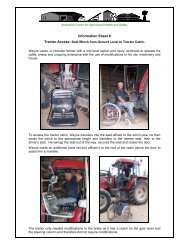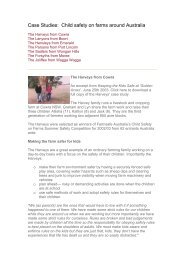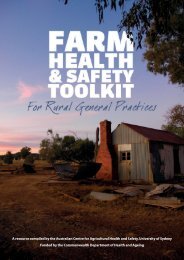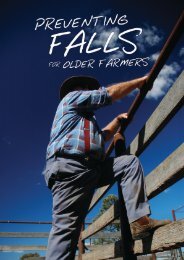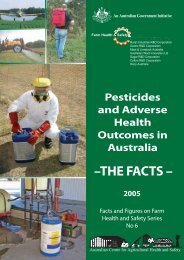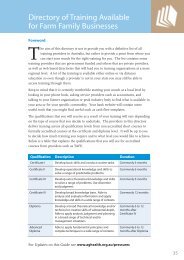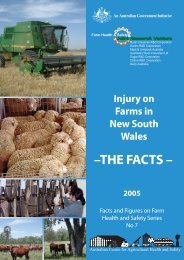Ripper ii Educational resource for primary schools - Australian ...
Ripper ii Educational resource for primary schools - Australian ...
Ripper ii Educational resource for primary schools - Australian ...
Create successful ePaper yourself
Turn your PDF publications into a flip-book with our unique Google optimized e-Paper software.
TOPIC 5: FARM EMERGENCIESOverview: Children identify and respond to emergency situations. Children develop interviewing skills to gather in<strong>for</strong>mation froma relevant “authority” and use this as the basis of a “news-style” report. Parents can assist children to develop an emergency planand identify key contacts <strong>for</strong> children in the event of an emergency at home / on their farm.Teaching Strategies ACTIVITIES ResourcesActivity 1: PREPARING FOR INTERVIEWKeypoint: Children can find out about actions in different kinds of emergency through interviewingan ‘expert’ in the field. Children can determine their own learning goals.Creating an“interviewschedule”Knowledge andunderstandingInvite and brief a guest speaker from one of the emergency services, police, ambulance, SESor fire service, doctor or community health / emergency department nurse to speak to the classabout home / farm injuries. The week be<strong>for</strong>e the guest speaker / visitor arrives, guide children in:• Determining what they would like to learn from the speaker about farm / home emergencies(eg. what is an emergency, examples, what to do).• Devise a set of questions children would like to ask the speaker (eg. about their job, some rescueor treatment stories etc.) Supplement the children’s ideas where necessary to include basics on:• What makes a situation an emergency (eg. the need to get help);• Who could help (eg. neighbours, relatives, emergency services)• How we could contact them• Create a table with a heading “Interview with ------” with the questions written in onecolumn and a space <strong>for</strong> answers on the right.• Children determine who will ask the pre-<strong>for</strong>med questions on their interview scheduleInvite guest speaker andprovide set of questionsGatheringin<strong>for</strong>mation –by “interview”Knowledge andunderstandingAnalysisPresentingin<strong>for</strong>mation -….an articleSynthesisActivity 2: INTERVIEWING A GUEST SPEAKERKeypoint: Children can ask questions and seek help from emergency workers, in class or in a realemergency. Knowing how to get help in an emergency saves valuable time and reduce the effects of injury.Arrange <strong>for</strong> the guest speaker to attend the class, with a brief on the nature of the questions.Children can:• Interview the speaker, starting with the prepared questions. In particular, find out whatin<strong>for</strong>mation children need to give over the phone to get help• If time allows, ask any other questions in response to what the speaker has said.• Thank the speaker and complete the interview sheet• Discuss the interview as a class or in small groups• Write an “article” or report about the interview using the interview sheets. Include:• who the visitor was and their role• particularly interesting / important points the speaker made• what the class learnt about emergencies and about the interviewing process• Select a report to include in the school newsletter50


